Search Results
Viewing: 1-334 of 334 | All

Article
How do we get the Urgent Care Wait Time?
Urgent Care wait times are an estimate of the time it will take for your child to see the doctor after checking into the Urgent Care.

Specialty
Urgent Care
The Division of Urgent Care provides timely medical care for the pediatric population of central Ohio. With seven convenient locations throughout Central Ohio, our Urgent Care Centers provide expert pediatric care: when and where you need it most.

Blog
Birth Spacing: Plan for Health and Safety
Planning for when to have a second, third or even sixth baby can be important to the health of both the birthing person and the new baby. Ideal pregnancy spacing is more than 18 months and less than 5 years.
Article
Pre-Op Process
Four weeks before your surgery date, you will begin an intensive program of nutrition and exercise education. This education will continue after your surgery, as well.

Technology Tools for More Timely Appointments
New “Save My Place” and “Fast Past” tools at Nationwide Children’s Hospital are helping families get earlier appointments for more timely care.

Article
Behavior Support - Reducing Interruptions
Children often interrupt at times when parents are busy or are not paying attention to them. To cut down on interruptions, use short teaching sessions. They will help you and your child communicate better.

Blog
What to Expect When Seeing a Pediatric Specialist
When your child is referred to a specialist, it can be a daunting experience. You often have to wait weeks (or months) for an appointment and may need to travel a significant distance just to get to the doctor’s office.

Article
Hitting Harms, Hugging Helps
Hospital visits can feel stressful. Here are tips to help when you or your child are running out of patience. When patience wears out, please remember hitting harms, hugging helps.

Blog
Get a Black Belt in Giving Medicine
So you waited to see the doctor, then waited in line for the pharmacist to give you your medicine, and now it’s time to give it to your kids. Maybe you got the “yummy pink medicine,” but not all medicines are yummy or pink.
News
Could Waiting Two Minutes Improve How Newborns Recover from Heart Surgery?
A newly funded study is set to determine whether waiting two minutes to clamp a newborn’s umbilical cord after delivery could improve how well he or she recovers from corrective heart surgery. Most physicians typically clamp and cut the umbilical cord immediately following delivery.
News
As Many Sick Kids Wait for Care, Upper Arlington Family Speaks Out for Preserving and Improving Childrens Access to Health Care
As federal legislators continue to grapple over the best way to bring better health care to all Americans, children’s health care hangs in the balance. That’s why a local Upper Arlington family is taking their story to Washington, D.C.

Article
Frequently Asked Questions
The heart transplant process may seem confusing or sometimes overwhelming. We understand, and our team is here to answer your questions.
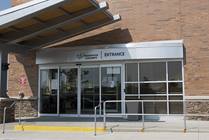
Blog
How to Choose an Urgent Care
Convenience seldom plays a role in the timing of your child’s illness or injury. Take the sudden earache at 3 in the morning…or a fall down the stairs on a Sunday afternoon. Sporting injuries are more likely in the evening or on a weekend.

Blog
What to Expect if Your Child Needs a Kidney Transplant
A common misperception is that only adults undergo kidney transplants. The truth is that, according to the United Network for Organ Sharing (UNOS), 760 children across America received kidney transplants during 2019.
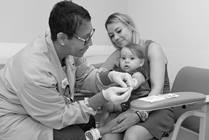
Blog
Blood Draws for Children: Keep Calm and Stay S.A.F.E.
The idea of getting blood drawn can be scary and it is not unusual for children to cry or be a little resistant during their visit to the lab. To help with this, Nationwide Children's Hospital Laboratory Services created the S.A.F.E. (Safe Area for Everyone) Program.

Blog
Rare Disease: Finding Answers for Patients with Mysterious Conditions
For a disease to be considered “rare,” fewer than 200,000 people in the United States will be affected by it. Some rare genetic disorders can be very difficult to diagnose, and for parents of a child with a rare disease, one of the most anxious times is the period of waiting for a diagnosis.

Article
Day of Surgery
From what to bring and where to go, to what happens when your child is in the operating room, we answer your questions about surgery day.

Blog
Urgent Care or Emergency Department: Which One Is Right for Your Child's Needs?
Not so long ago, parents had two choices for after-hours medical care: wait for the doctor’s office to open or head to the local emergency room. Today’s parent has more choices, including urgent care centers, grocery store clinics and the newest player in town – the stand-alone ER.

Blog
Stuttering: Will My Child Outgrow It?
Stuttering is common when children are learning to talk. As a parent, this can be a stressful time full of questions. It’s difficult to know what is normal and what isn’t.

Blog
Walk This Way: Pedestrian Safety Tips
No matter where you're walking, safety should always be your top priority. When you’re sharing the road with cars, bikes, and buses, a little extra caution can go a long way.

Blog
Surviving the Stomach Bug: Parent Edition
Vomiting, diarrhea, chills and aches…stomach bugs are never a fun adventure. Often times called the stomach flu, stomach viruses are actually not influenza, typically. Most of the time, it is caused by viruses such as rotavirus, adenovirus and echovirus.
Article
Echocardiogram With Sedation or Anesthesia
This Helping Hand™ is about why some children may need special medicine when getting an echocardiogram done. This test, also called an echo, is an ultrasound of the heart.
News
Study Finds Computerized Screening with Immediate Results Helps Physicians Identify Dangerous Behaviors among Adolescents
Technology may be the key to identifying high-risk behaviors among adolescents. Injury risk, depressive symptoms and drug and alcohol use are the leading causes of adolescent morbidity and mortality; yet pediatricians often lack the time to screen for these behavioral concerns.
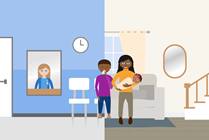
Save My Place
Use Save My Place to let us know your child needs to be seen at Urgent Care. We’ll save your place in line by giving you an arrival time.

Blog
Misdiagnosing Yourself or Your Child Can Be Dangerous
Instead of relying solely upon the internet to help answer all of your health questions, consider using that as a starting point for conversations with your (or your child’s) personal doctor.
Article
STAR Program
STAR Program is a social group program that teaches children the fundamental social skills necessary to build relationships. It is composed of preschool, elementary and middle school children.

Article
Back-to-School Safety
When summer comes to an end, children get ready to go back to school. This is a great time for parents to talk to their kids about how to safely travel to and from school.

Blog
Establishing Bedtime Routine and Helping Your Child Fall Asleep
If you have a child who cries or calls out after they are put in bed, refuses to sleep in their own bed or insists an adult stay with them, you can use the following tips to help your child learn to stay quietly in bed until they fall asleep.

Blog
Using Brain MRI to Fight Delays in Preemies
When I started working as a neonatologist almost 15 years ago, I loved helping premature babies cope with the problems of being born too early. But I hated having to tell worried parents that they would just have to “wait and see” if their baby would have developmental problems.

Provider
Jaimie D Nathan
Jaimie D. Nathan, MD, FACS, is Chief of Pediatric Abdominal Transplant and Hepatopancreatobiliary Surgery at Nationwide Children’s and surgical director of Liver Transplant. A renowned pediatric transplant surgeon, Dr. Nathan has extensive experience in liver transplants – including performing transplants in patients as young as 12 months. Areas of expertise include utilizing all technical variant grafts in liver transplantation, including split livers, reduced-sized grafts and living donor liver transplantation, to optimize outcomes and minimize time on the waiting list.
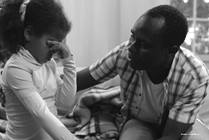
Blog
Starting the Conversation About Big Feelings
It’s important to work with your child on emotions throughout their entire childhood, including the teen years. This means taking the time to have ongoing conversations about how to handle emotions in a healthy way, which is called “coping.”
Article
Antroduodenal Manometry
An antroduodenal manometry records the pressure waves that are produced in the stomach and small intestine.

Blog
7 Ways for Parents to Support Their Child In Their First Relationship
How can parents of teens have a conversation and an open line of communication upon his or her first relationship without it seeming like an after-school special? Here are some of our expert's favorite tips to address questions and concerns.
Article
Upper Endoscopy With General Anesthesia
This Helping Hand™ is about how a doctor or health care provider uses an upper endoscopy to look for signs of redness, swelling, bleeding, ulcers, or infections.
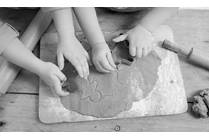
Blog
How to Cultivate Holiday Rituals and Traditions with Your Children
It’s that time of year. Fall colors have dropped, the wind has turned brisk, and we enter a season of celebration. Some of us begin with gusto, humming songs of the season with the same breath that extinguished the jack-o’-lantern. Others don’t like to rush it.
Article
Colonoscopy with General Anesthesia: Infants and Toddlers
This Helping Hand™ is about how colonoscopies are done, how to prep for one, and what to expect for infants and toddlers.

Specialty
Psychiatric Crisis Department
The Psychiatric Crisis Department treats children and adolescents for mental and behavioral health crises. It’s like an emergency room for children experiencing a mental or behavioral health crisis.
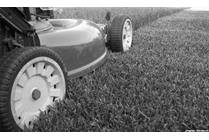
Blog
Lawn Mower Safety: Why Kids Should Stay Inside When You Cut the Grass
While there are plenty of fun things to do and explore and we want kids to be outside learning and growing, there is one time we recommend you keep them inside: when you are mowing the lawn. Every day emergency departments around the country treat 13 children for lawn mower-related injuries.
Article
Angiogram
Learn more about an angiogram, also called an arteriogram, which is a test that is done to study the size and shape of your child's blood vessels.
Article
S.A.F.E. Program
We want to help create an optimal experience in an environment that is both calm and safe as possible. Learn about the S.A.F.E program.

Blog
Dear Nicu Mom: You Are Finally Going Home
I am a NICU mom. For the past 175 days, I have been a NICU mom. I have watched my daughter grow and thrive inside the walls of Nationwide Children’s Hospital. I have ridden the NICU rollercoaster, with all of its ups and downs, and it has been a tumultuous, bumpy ride.
Article
Physician Connect
Physician Connect helps medical professionals provide great pediatric care for their patients by providing expert pediatric content direct from Nationwide Children's.

Blog
Supporting Your Teen: Parenting Strategies for Today’s Challenges
Parenting a teenager is a hard job and can be overwhelming for both parents and their kids. Teens are learning to manage emotional shifts, hormonal changes, and increasing independence.
Article
Colonoscopy with General Anesthesia: Children (44 to 88 Pounds)
This Helping Hand™ is about how colonoscopies are done, how to prep for one, and what to expect for children.
Article
Colonoscopy with General Anesthesia: Teens and Adults (Over 88 Pounds)
This Helping Hand™ is about how colonoscopies are done, how to prep for one, and what to expect for teens and adults.
Article
Feeding Your Baby Solid Food
Babies should be fed only breastmilk or formula until about 6 months of age. Solid foods can then be started when your baby is ready.
Article
Use Strength and Preparation to Keep Your Dancer in Top Form
Most young ballerinas can’t wait to take their dancing to the next level, but there are some things to consider so they don’t end up damaging their feet.

Condition
Eosinophilic Esophagitis (EoE)
Eosinophilic esophagitis is a condition in which large numbers of eosinophils, a white blood cell, build up inside the esophagus and cause inflammation.

Specialty
Lung & Heart-Lung Transplant Program
Our program utilizes a multidisciplinary team of lung transplant and heart-lung transplant experts in the transplantation of children and adults with childhood lung diseases.
Article
Centering Pregnancy
The CenteringPregnancy program brings together women who are at similar stages of pregnancy to meet, learn care skills and participate in group discussions.

Blog
Not So Fast! Transitioning Your Child to the Next Car Seat
The truth is, many parents transition car seats too early. But, when it comes to keeping your kids safe, making sure they are in the right type of car seat is one of the most important ways you can protect them.
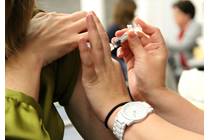
Blog
4 Flu Myths Busted
While medical professionals encourage everyone to get their annual flu shot, many buy into the long-held myths about the vaccine and miss opportunities to avoid getting sick.
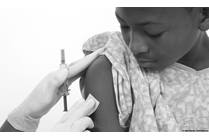
Blog
Back to School Vaccines: Getting Protected from Potentially Dangerous Diseases
School may be out for summer, but it’s the perfect time to check off your child’s vaccine needs. From kindergarten boosters to teen meningitis protection, learn which immunizations are required and when to help keep your child safe and healthy this school year.
Article
What To Expect: CCPR
Learn what to expect before, during and after your visit at the Center for Colorectal and Pelvic Reconstruction.
Article
Prepare for Your Sports Medicine Visit
How you can prepare for your visit at the Sports Medicine clinic at Nationwide Children's Hospital.

Blog
Eat Slowly to Prevent Weight Gain in Kids
Conventional wisdom and medical experts alike tell us that in order to weigh less we need to eat less, but this simple advice can be hard to follow. Eating slowly is one way to help children curb their calorie consumption without restricting their favorite foods or strictly limiting portion sizes.
Article
Transplant Guide
Check out a compiled list of answers to the questions we hear most often about lung and heart-lung transplant.

Blog
From Care to Compassion: Steps to Becoming a Foster Parent or Supporting Foster Families
In every community, there are children who need love, support, and stability. For those considering fostering a child, the journey from care to compassion is both profound and rewarding. Whether you're exploring becoming a foster parent or seeking ways to support the foster care community, there are resources and support to help navigate this path of empathy and action.

Multimedia
How to Use An EpiPen
Knowing how to use an EpiPen is important. Doctors are seeing more and more children with allergies, especially food allergies. EpiPens deliver medicine quickly and effectively. No child has ever had serious problems from a standard dose of epinephrine when using an EpiPen.

Blog
Common Breast Disorders in Adolescents
Adolescence can be a challenging time for teenagers. During that time, their bodies grow and change. One common area of change in teenagers is the chest area. These changes may include macromastia, asymmetric breasts or gynecomastia.

Blog
How to Bathe Your Baby: What You Need to Know
Giving a baby a bath can be intimidating at first – they are wiggly and slippery and SO tiny. Below are some tips that will help you have a positive and safe bath time experience.

Blog
Creating a Successful Morning Routine
With preparation and practice, you can set up your family’s morning routine to go more smoothly and help your child to become more independent.
Article
Spinal Fusion
Does your child have scoliosis? Learn more about a spinal fusion to correct the spine.

Blog
Running: Something the Entire Family Can Do Together
Running is a great activity that can be done with minimal equipment and is something that all ages can perform. However, this may not always look the same for everyone as age, strength and body type may differ.

Blog
Medical Considerations While Fasting
People practice fasting for various reasons, including spiritual, personal or health reasons. The length of time for fasting can vary based on a person’s individual goals, or the fast may be an established timeline for a religious observation.
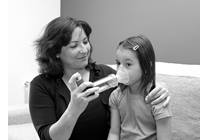
Blog
What is Allergy Induced Asthma?
For many people with asthma, spring can be a very challenging time of the year. Rapid changes in the weather and lingering upper respiratory viruses can both cause breathing difficulties.
Article
Colonic Manometry
This Helping Hand™ covers colonic manometry, a test that records the pressure waves that are produced when the large intestines contract.

Article
Behavior Support - Using Planned Ignoring at Home
Planned ignoring, or extinction, is not paying attention to a problem behavior in order to decrease the behavior in the future. Your behavior support provider will teach you how to use planned ignoring.

Specialty
Center for Limb Lengthening and Reconstruction
Our comprehensive center treats children, adolescents, and adults with all types of limb length discrepancies and limb deformities, including congenital, developmental, or post-traumatic limb deformities.
.jpg?w=209&h=140&as=1&bc=FFFFFF&IgnoreAspect=False&hash=514D03A41FBF7F2A5861FAB4040EF429)
Blog
Beyond the Birds and the Bees: Talking with Your Children About Getting Pregnant
You should not wait for your child to ask questions about sex. Children are curious, but most are not bold enough to openly speak with their parents about sex and pregnancy. It’s important to remember that sex is a natural part of life and they shouldn’t feel ashamed by their feelings.
Article
Headache Causes and Advice
Learn how adults can help children make changes to decrease or get rid of headache triggers.
News
American Electric Power Foundation Donates $1 Million to Nationwide Childrens Hospital Supporting Telemedicine Services
The AEP Foundation recently donated $1 million to Nationwide Children’s Hospital to support the expansion of its telemedicine services into rural areas of southeast Ohio.

Blog
Separation Anxiety: How to Ease Your Child's Mind
It’s important to understand the difference between anxiety that’s part of normal development and anxiety that’s excessive, so you can seek support for your child when needed to help ease these symptoms.

Blog
A Cure for Food Allergies? Not Just Yet.
In the United States, approximately 5-8% of all children have a food allergy. Any one of the parents of these children will tell you that they cannot wait for a cure. Food allergy reactions can occur after ingestion of just a trace amount of food.
News
Study Shows Asking Adolescents Sensitive Health Questions by Computer Results in Honest Answers, Better Care
Parents of teens know just how difficult it is to get them to talk about their personal lives, let alone their health. With only 20 percent of children with mental health problems in the United States being properly identified and treated, it is imperative that a solution be found.

Blog
Traveling with Kids: Planes, Trains and Automobiles
Going on trips with small children requires a lot of packing and A LOT of planning, but it is totally worth it. Take lots of pictures, make lots of memories and have fun!

Blog
7 Ways to Help Kids Cope Through Change
For better or worse, change has become the new normal, creating feelings of stress in both children and adults. As we adjust to important changes, we can find ourselves weighed down by worry and uncertainty. How do we cope in an ever-changing world?
News
Conjoined Twins Successfully Separated at Nationwide Childrens Hospital
Twin girls born joined at the pelvic and hip region are recovering after separation surgery Thursday, Sept. 3, at Nationwide Children’s Hospital.

Blog
Transitioning from Crib to Toddler Bed
The American Academy of Pediatrics (AAP) recommends transitioning a child out of a crib and into a toddler bed once the crib railing is lower than their chest. At that height, children are more easily able to climb out of the crib, which can lead to injury.

Blog
Why Your Toddler is Biting and Hitting
Biting and hitting are common problems during the toddler years, and whether your child is on the giving or receiving end, your goal is the same: you want the behavior to stop.

Blog
Adolescent and Young Adult Cancer: The Importance of Research to the AYA Community
The definition of the adolescent and young adult (AYA) cancer patient has evolved over time, but in the United States, it is defined as those diagnosed with cancer between ages 15–39 years. AYA patients are a unique population with regard to both their cancer and psychosocial needs.

Condition
Enlarged Lymph Nodes
Hundreds of these lymph nodes are present in your child’s neck and face. When an infection is present, lymph nodes can become enlarged as an immune response is mounted.

Blog
Why Is My CCPR Clinic Visit So Long?
The Center for Colorectal and Pelvic Reconstruction was created to be a “one stop shop” for the most complex colorectal patients and their needs.
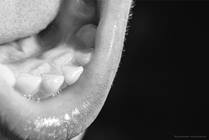
Blog
What Are "Shark Teeth"?
The front baby teeth start falling out at around six years old. However, what if you see another row of teeth behind the baby teeth? Some people call this “shark teeth” because of its distinctive look as the adult teeth come in behind the baby teeth.

Blog
New Obesity Guidelines for Children and Adolescents
For the first time in fifteen years, the American Academy of Pediatrics released new treatment guidelines for children and adolescents with obesity.

Blog
What to Expect at Your Child's First Dental Appointment
Have you ever wondered when your child should visit a dentist for the first time? If so, you are among many parents who frequently ask the question. And like many parents, you may be surprised by the answer.

Article
Holiday Safety
Shopping for presents, decorating the house and visiting relatives make the holidays a fun and exciting time of year. Help keep your family healthy at the holidays by following a few safety tips.

Blog
Labial Adhesions: The Gynecological Problem You Haven’t Heard About
When the inner lips (labia minora) of the vagina become stuck together, it is called a labial adhesion. This is typically seen in girls between the ages of 3 months and 6 years old.

Blog
Screen Apnea in Kids and Finding Balance with Technology
While technology isn’t starving our kids of oxygen, it does have an impact on the way they act, think, and sleep. Being aware is the first step. Take a deep breath and plan to take a screen-free break with your kids today.
Article
Sweat Chloride Test Collection Guidelines
Prepare for your child's sweat chloride test with this Helping Hand.
News
New Study Shows Adolescents Disclose Suicidal Thoughts Using Computerized Tablet
Suicide is a leading cause of death among adolescents ages 10 to 19 years old. Research shows that most pediatric primary care physicians do not routinely ask youths about suicidal thoughts.

Blog
6 Tips to Be a Supportive Stepparent
Taking two families and making them one is no doubt a challenging task. Using these tools below can help you and your family navigate the transition and help you be the best stepparent you can be.
Multimedia
How to Use an Inhaler with a Spacer and Mask
Using an inhaler with a spacer and a mask is an asthma treatment option for smaller children and babies.

Blog
Injury Prevention in Softball and Baseball
Throwing injuries can put limitations on the ability of some athletes to continue playing their sport. Throwing and pitching require repetitive, explosive body movements to be executed with precision and athletes perform these motions thousands of times in a season.

Specialty
Hematology and Oncology Outpatient Clinic
The Hematology and Oncology Outpatient Clinic is designed to be a link between the family, home and the hospital.

Blog
Sleep Training for Babies: How Everyone Can Get a Better Night’s Sleep
The joys of having a new baby…. and oh, the restless, sleep-deprived nights! One of the most common questions I get asked as a pediatrician is how to sleep train a baby. This is a time-tested recipe for establishing a sleep routine early on.
Pyogenic Granuloma
A pyogenic granuloma (pie uh JENN ik gran yuh LOH muh) or PG is a vascular (blood vessel) growth. It usually appears after an area of skin that has been injured.

Blog
Understanding the Dangers of Treadmills
Exercise equipment is commonly used to improve personal health and well-being and treadmills account for about 25% of exercise equipment purchased for home use. Previous studies have shown that the rate of treadmill-related injuries appears to be rising.

Article
Going Home
Your child's return home from the hospital will go more smoothly for everyone in the family if you prepare and know what to expect.
Article
Rabies Vaccine Treatment
This Helping Hand™ is about the treatment for rabies. Rabies is a serious disease mostly caused by wild animals. Here we'll go over what steps to take if you're bitten.
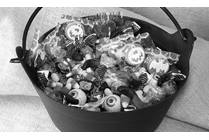
Blog
6 Tips for Trick-or-Treating with Food Allergies
Any food centered event can introduce challenges for families and children with food allergies. Trick or treating and Halloween celebrations, in particular, present opportunities for increased exposure to food allergens, which can be present in candy and other treats.
News
Weight-Loss Surgery in Teens with Severe Obesity Offers Greater Benefits Than Waiting Until Adulthood
A study from the New England Journal of Medicine has revealed that adolescents who underwent gastric bypass were more likely to experience a complete remission of diabetes and hypertension by 5 years after surgery compared to adults — who also had severe obesity as adolescents — who underwent the procedure.
Article
An Athlete's Guide to Concussions
The Concussion Center at Nationwide Children's wants you to be aware of concussions and the potential dangers to athletes in any sport.

Blog
Bladder Exstrophy: Care by Age and Stage
Nationwide Children’s Hospital offers a two-stage care approach to bladder exstrophy that gives families time to bond with their child, time to adjust and time to develop a plan with our experts.
Article
Colostomy Closure: A Parent's Checklist
Once a young child’s colostomy is closed, parent support is very important to help set the stage for consistent bowel movements and successful potty training.
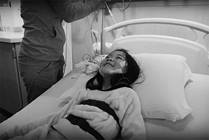
Blog
What to Expect When Your Child Needs a Sleep Study
There are many reasons why your child’s doctor may order a sleep study. Often it is to find out if a child has difficulty breathing while sleeping. Knowing what to expect makes this an easier procedure for you and your child.

Blog
Autism Spectrum Disorder: Should Every Child Be Screened?
For several years, most pediatricians have been following guidelines created by medical experts that suggest all children between the ages of 18 and 24 months be screened for an autism spectrum disorder (ASD) – even if the parents aren’t worried about development or behavior.
Article
Ureteroureterostomy
An ureteroureterostomy is a surgery done to help the kidney drain urine down to the bladder. This operation is sometimes done in children who have what is called a “duplex kidney.”

Specialty
Liver Transplant Program
When your child needs a liver transplant, expertise and experience matter. Liver transplantation in children is a highly successful therapy. To maximize success, an individualized approach tailored to each patient is imperative to achieving best outcomes.

Blog
Preparing Your Child for Colorectal Surgery
Hospitals can be an unfamiliar place and having surgery can make an already stressful situation worse. To prepare your child for surgery, it is important to be honest, but consider their developmental age before telling them about their upcoming surgery.

Blog
Pediatric Spinal Anesthesia: An Alternative to “Going Under”
Spinal anesthesia is an alternative to general anesthesia, which allows your child to undergo their surgery without being put into a drug-induced sleep.

Blog
Why Do Kids Need to Go to the Doctor so Often?
If you’re a parent, I don’t need to tell you how fast children grow – physically and emotionally. And your questions and concerns grow right along with them. This is why well child visits are so important.
Article
Neurogenic Bowel Regulation
A child who has a neurogenic bowel cannot control when he or she has a bowel movement. Bowel control may not be possible, but bowel regulation can be done by following a daily schedule.

Condition
Diabetes Ketoacidosis (DKA)
Diabetic ketoacidosis, also known as DKA, is a serious complication of diabetes. When cells do not have glucose to use for energy, the body starts to use fat for energy. Acids called ketones are made when fat is used for energy. If untreated, this leads to DKA and life-threatening problems.
Article
Dental Injury: Post Treatment Instructions
When a child has a serious dental injury, it may take many weeks for the teeth and gums to heal before we know if they will have problems in the future. With prompt and proper follow-up care by a dentist, some problems, such as pain and infection, can be caught and treated early to prevent future problems.
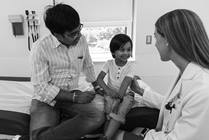
Blog
5 Questions Parents Need to Ask Before Leaving the Emergency Room
A sick child is every parent’s concern. Most aim to alleviate their kid’s discomfort at home and follow up with their pediatrician, but when an emergency room visit is required, that concern can become overwhelming.

Article
Adult Volunteering
View adult volunteer requirements and learn about the application and interview process.

Article
Inpatient Services
The inpatient psychiatric unit is the highest level of mental health care available at Nationwide Children’s and provides intensive hospitalization for youth 3-17 years of age. Learn what to expect if your child is admitted.
Article
Awards and Recognition
Medical staff leadership would like to acknowledge physicians for recently receiving positive comments from patients and families.
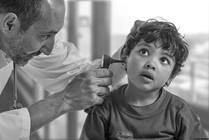
Blog
Ear Infections: Why Kids May Not Need 10 Days of Antibiotics
The American Academy of Pediatrics (AAP) updated their recommendations for treating childhood ear infections in 2013. The current guideline states that a full ten days of antibiotics may not be necessary for children over two years of age with non-severe ear infections.
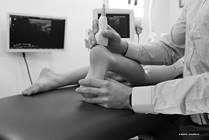
Blog
Diagnostic Ultrasound: Evaluating Athletes at a Faster Pace
While most people think of ultrasound as a device used during pregnancy, it is an important tool used by many medical specialties – including sports medicine.

Blog
What to Do When Your Child Swears
Children may use swear words because they have heard adults use them, they are frustrated or angry and don’t have the skills to express themselves, to show they are tough or to bully others. So, how do we discourage and manage swearing?

Blog
4 Tips for Helping a Child with a Cancer Diagnosis
If you know a child with a cancer diagnosis, it can be difficult to understand how to support them and their family. Every child is different - learning and listening can help you be the most effective supporter during a difficult time.
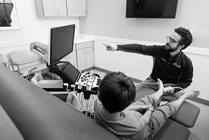
Article
Musculoskeletal Ultrasound
Learn how our team uses ultrasound to diagnose injuries and help athletes return to sport.
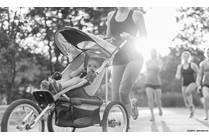
Blog
Choosing a Stroller: Best Tips to Keep Your Child Safe
Parents with young children have so many decisions to make and so many pieces of “equipment” to get. One of the bigger decisions is choosing a stroller that fits both your baby and your family’s lifestyle. There are many different options out there and it can get overwhelming.
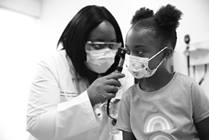
Blog
Keeping Children Healthy: The Importance of Well-Visits
Visits to doctors have decreased in many areas of the country because parents are afraid to potentially expose their children to COVID-19. What you may not know is that doctors and their office staff have been taking measures to protect patients, families and staff.

Blog
Night Terrors
It’s that time of year, and the scene is the same in neighborhoods across America. Lawn ornaments have morphed into giant spiders, life-sized witches rest on once-empty front-porch rockers, and tree-hanging birdhouses have made way for swaying skeletons.

Blog
How to Talk to Kids About Divorce
Divorce can be a life-altering transition -- not just for parents, but also for children. While every family’s experience is different, many parents worry about how their children will adjust and what they can do to support them through the transition.
Article
Weaning Your Baby: Cup Feeding
Weaning is the time when your baby learns to drink from a cup instead of from a breast or bottle. Infants usually stay on formula until their first birthday. Give formula in the cup instead of cow's milk if you wean your child before one year of age.

Article
Bedtime Problems
Getting a child to go to bed is a common problem that many parents experience.

Blog
Watch the Great American Eclipse… Safely!
Once upon a time, there was a Hindu demon named Rahu. He wanted to live forever, so he disguised himself as a god and set out to steal an elixir of immortality. The sun and moon saw what Rahu was doing and reported the incident to the god Vishnu, who chased down the demon and cut off his head.

Blog
The Pros and Cons of Homemade Baby Food
Commercial baby food is expensive, and many parents question the quality of ingredients in the jar. Homemade baby food provides convenience, flexibility and more choices.
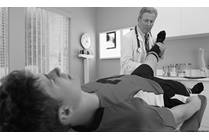
Blog
Why Your Child's Sports Physical Should Be Done in a Doctor's Office
Sports physicals should ideally be performed at least 6 weeks prior to the start of practice to allow adequate time for further evaluation, treatment and rehabilitation of any identified conditions and should be performed by the athlete’s primary care physician in the medical home.
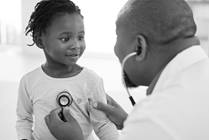
Helping Kids Keep Their Same Provider
Children who visit the same primary care provider over time have better overall outcomes. Over the last five years, an innovative project at Nationwide Children’s Hospital has raised the continuity rate to greater than 70%.

Condition
Fever
In this Helping Hand™, we discuss fever, which is an increase in the body’s temperature above the normal range. Most doctors agree that a temperature over 101° F is a fever. Fevers lower than 101° F don't need to be treated unless your child is uncomfortable or has a history of febrile seizures.
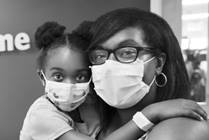
Specialty
Coronavirus (COVID-19): Information for Patient Families
Learn more about the symptoms of Coronavirus (COVID-19), how you can protect your family, and how Nationwide Children's Hospital is preparing.
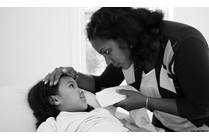
Blog
What Parents Need to Know About Adenovirus
Adenovirus infections peak in winter and spring; but unlike the flu, they remain common throughout the year. These viruses cause about 10 percent of all childhood fevers, and nearly every child has had at least one adenovirus infection by 10 years of age.
Article
Iron Infusions
The most common cause of anemia is not having enough iron. If you have anemia and cannot take iron orally (by mouth), you can get iron through an IV infusion.

Blog
Epilepsy: Management in School and Sports
Epilepsy can be a challenge for school-aged children, but by partnering with teachers, coaches and caregivers, successful management is entirely possible. Here are some tips to help everyone keep your child safe at school.

Article
Nightwakings
Nightwakings in young children is one of the most common problems parents face.
Multimedia
Allergy Shots for Your Child
You have allergies, and your doctor thinks allergy immunotherapy, or allergy shots, might help you feel better.

Blog
Flood Safety
Data suggests that natural disasters are increasing in frequency and intensity causing more destruction than at any other time in recorded history. Floods and flash floods are among the most frequent and impactful disasters in the United States.
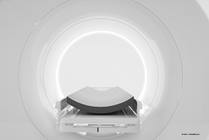
Blog
Helping Children (and Parents) Prepare for an MRI
Since the fall of 2014, radiology child life specialists have been supporting patients with the use of an MRI simulator which teaches patients more about completing an MRI without sedation.
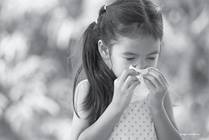
Blog
COVID-19 and Pollen Allergies: The Perfect Storm
As much as we all hoped we wouldn’t have to worry about this again, the COVID-19 pandemic persists as the spring tree pollen season begins. Pollen allergies affect millions of children and adults, causing misery for weeks to months each spring, summer, and autumn.

Article
Building Community Through Youth Sports and Mentorship
Learn how community outreach initiatives, like youth sports programs, are helping elementary students like Tekle.
Article
Awards and Recognition
Medical staff leadership would like to acknowledge physicians for recently receiving positive comments from patients and families.
Article
Changes After Bariatric Surgery
Learn more about emotional and physical changes after bariatric surgery.
Article
Use of Electronic Devices
This Helping Hand™ explains the guidelines for using cell phones and other electronic devices while visiting the hospital. Please follow these guidelines when visiting us.

Blog
Radon: Keeping Your Family Safe
Radon is a gas that occurs naturally from the breakdown of a substance called uranium. Radon can get into your homes through cracks in your foundation, gaps in floors or around pipes, construction joints and even the water supply.

Blog
Household Cleaners and Eye Injuries: The Importance of Safe Storage
Household cleaning products represent a major source of exposures reported to U.S. poison control centers, and they commonly involve the eyes, especially among children.
Article
How to Choose Orthotics
Improper foot alignment can cause pain anywhere in the foot, legs, and back. Some lower extremity pain and injuries may be helped and/or prevented by orthotics.

Blog
8 'Not Now' Tips for Teens: Real Strategies for Denying or Delaying Sexual Behavior
Despite knowing about the risks of unsafe behaviors related to drugs, alcohol and sexuality, teens and adolescents still feel the powerful pull of peer pressure.

Condition
Trichomonas
Trichomonas is a sexually transmitted infection (STI). Anyone who is sexually active has a chance of getting trichomonas.
Ovarian Cyst
An ovarian cyst s a fluid filled sac in or on the surface of an ovary. It often forms during or after ovulation.
Article
Mouth Guards in Sports: A Necessary Piece of Equipment
Some experts recommend that mouthguards be worn by athletes in competitive and recreational sports in which impact, contact and collision are likely to occur.
News
Sacral Nerve Stimulation Gives Pediatric Patients Hope
Heather Rayser, 16, has a colon that does not function properly and as a result, she has never been to high school, and has been on home hospital care for nine years.

Article
Helping Children Cope During Visits to the Doctor
When a child needs to see the doctor or go to the hospital, parents often want to know how they can make the experience easier for their child.
Article
Auditory Brainstem Response (ABR) with Sedation or Anesthesia
This Helping Hand™ explains the process of an auditory brainstem response (ABR) with light sedation or anesthesia.
Article
STOP THE MADNESS - How to be a Good Fan
Anyone who has spent time around youth athletics is sure to have seen inappropriate sideline behavior. To help kids get the most out of their experiences, parents need to be good “sports” parents.

Blog
The Myth of the Hypoallergenic Dog
About two-thirds of homes in the United States have at least one pet, and most of these have dogs. In addition, 10-20% of all children and adults across the world are allergic to dogs. That means there are a lot of people that live with the very animal that can cause them misery.

Blog
Treating Crohn's Disease with Nutrition Therapy
If you could treat your child’s Crohn’s disease with nutrition therapy instead of medication, would you do it? What if the nutrition therapy mostly involved drinking nutritional shakes instead of eating foods? Well, nutrition therapy is an effective treatment for Crohn’s Disease
Multimedia
How to Use an Inhaler with a Spacer and Mouthpiece
Learning how to properly use an inhaler with a spacer and mouthpiece for asthma ensures the medicine gets deposited into the lungs.

Condition
Attention Deficit Hyperactivity Disorder (ADHD)
Attention Deficit Hyperactivity Disorder (ADHD) is a condition characterized by inattention, impulsiveness and hyperactivity. Symptoms are usually noticed by the time a child starts school. Treatment of ADHD may include family or individual counseling. Medicines may also be prescribed.
Article
Understanding Pain
Pain is an alarm signal that occurs when the body is in danger. Think of it as protection from harm.

Blog
Kids and ATVs: How to Help Prevent Severe Injuries
Although there has been a decline in ATV-related injuries in recent years in the United States, children younger than 12 years make up almost half of ATV-related head and neck injuries.
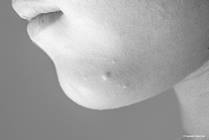
Blog
Molluscum Contagiosum: What You Need to Know
Despite its big, scary-sounding name, molluscum contagiosum is a common and relatively harmless skin condition seen in many children. It comes in the form of bumps that range in size from a pinhead to a pencil eraser.

Blog
How Much Food is Just Right? A Handy Guide to Portions
Are you trying to figure out what and how much to feed your child or adolescent? How much food they need will vary as they grow and depending on their activity level.
Article
Exercises: Upper Extremities Infant (Passive)
Range of motion exercises help keep your baby's joints and muscles loose and easy to move. An exercise program is planned for each child’s needs.
Article
Toilet Training
This Helping Hand™ goes over when to start potty training and tips to help make it a rewarding journey for you and your little one. Being consistent and positive will help your toddler succeed in potty training.

Blog
5 Ways to Prepare for Football Camp
It’s July and that means football players everywhere are knee deep in summer workouts, overnight skills camps and preparation for the start of two-a-day practices. There are few things parents can do to help with this ahead of time that can make a world of difference.

Article
All Terrain Vehicles (ATVs)
Given the rapidly increasing injury rates affecting children under 16 years of age, researchers recommend taking actions to help prevent injuries and deaths related to the use of ATVs.
Article
Community Provider Corner
- Free Summer Resources for Families
- Navigating the Mental Health Crisis in Rural Ohio
Article
Cystogram: Nuclear Medicine
Learn more about nuclear medicine cystogram, the test that shows the size of your child's bladder and how it is working.
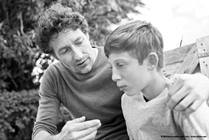
Blog
Suicide: The Conversation We Should Have With Our Kids
One of the best things we can do is give our young people the power to talk about mental health issues and topics as challenging as suicide without shutting the door. Even if your child is doing well, this is a powerful opportunity to help your child see it is okay to be emotionally open and could help them talk openly with friends.

Blog
Keeping Kids Safe in Holiday Crowds
Between hectic trips to the mall for holiday shopping and frenzied airport terminals, it can be difficult to keep track of your little ones in the chaos. If you and your child are separated, having a safety plan can save their life.

Blog
Fireplace Safety: My Family’s Story
There will come a time when your child, babysitter, friend, or family member turns the fireplace on without thinking, so be sure your home is set up for safety.

Blog
Guardianships and POAs: Transitioning to Adult Care
Most parents don’t stop worrying about their child after they turn 18. For parents of young adults with lifelong medical conditions and cognitive or learning disorders, there is an added worry of whether their child can be their own advocate.

Blog
Can Antibiotics Help Your Child’s Ear Pain?
It is late at night and your child wakes up with a horrible scream. She is holding her ear, crying and is unable to be consoled. You’ve given her ibuprofen. You’ve given her acetaminophen. These over-the-counter medications help a little, but she is still sobbing, asking you to do something to make it better.
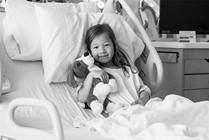
Blog
Kidney Transplants and Donation: Having a Tough Conversation that Could Save a Life
Most parents feel overwhelmed and nervous to bring up transplant around others. It is important for caregivers to know that others want to help, but they cannot help if you do not let them know how.
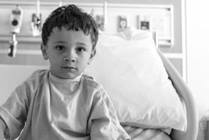
Specialty
Motility Center
Chronic GI, swallowing and stomach issues take a physical and emotional toll on children and families. The Motility Center team looks at behavioral-related motility problems and complex gastrointestinal disorders to help diagnose and treat these complicated digestive disorders.
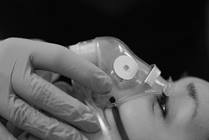
Blog
Enterovirus D68: Learn the Facts
Runny nose, cough and congestion are sweeping across central Ohio. You know this because you’ve seen it in the news, on social media feeds, and (if you’re like me) in your own home. It happens this time every year.
Trichomonas: Expedited Partner Therapy
If partner was diagnosed with trichomonas, a sexually transmitted infection (STI), you may also be infected and should be treated. This infection is serious but can be cured with antibiotics.

Condition
Ganglion Cysts
A ganglion cyst is a fluid-filled lump under the skin, often over a joint or in a tendon in the hand or wrist. If the cyst appears on top of the wrist, it is called a dorsal wrist ganglion cyst. A cyst on the palm side of the wrist is a volar wrist ganglion cyst. These cysts are usually harmless.

Condition
Gonorrhea
Gonorrhea is a sexually transmitted infection (STI) caused by the germ Neisseria gonorrhoeae. Anyone that is sexually active is at risk of getting gonorrhea. Those who have had more than one sexual partner are at higher risk of getting infected.

Condition
Chlamydia
Chlamydia is a sexually transmitted infection (STI) caused by the germ Chlamydia trachomatis. Anyone that is sexually active is at risk of getting chlamydia.
Article
Moving from Pediatric to Adult Care: Finding a Doctor
Take the big step in moving from Nationwide Children's Hospital to a provider that sees adults with this Helping Hand.
Article
Hydrogen Breath Test
This Helping Hand™ is about how a hydrogen breath test is done and how to prepare for it.

Article
Sibling Rivalry
Sibling rivalry is competition or conflict between children being raised in the same family. It is a natural part of growing up that will impact how they learn to resolve problems.
Article
Button Battery Safety
More and more household items have button batteries. These items include: remote controls, thermometers, games, toys, hearing aids, calculators, bathroom scales, musical greeting cards, key fobs, electronic jewelry, holiday ornaments, cameras, and candles
News
Nationwide Childrens Hospital Reminds Parents to Stay Alert during Holidays
The holidays are an exciting and busy time of year as parents race to finish the shopping, decorating and baking. As the number of days left in the calendar year winds down, be sure to allow plenty of time in that hectic schedule for playing with your child and sharing holiday traditions as a
News
Holiday Hazards
The holidays are an exciting and busy time of year as parents race to finish shopping, decorating and baking. As the number of days left in the year winds down, be sure to allow plenty of time in the hectic schedule for playtime with your child and sharing holiday traditions as a family.
News
Nationwide Childrens Hospital Reminds Parents to Stay Alert During Holidays
The holidays are an exciting and busy time of year as parents race to finish shopping, decorating and baking. As the number of days left in the calendar year winds down, be sure to allow plenty of time in the hectic schedule for playtime with your child and sharing holiday traditions as a family.
Article
Frame and Pin Site - Care at Home
External fixators (frames) are used to hold an arm or leg bone in place so it can heal after surgery for limb-lengthening or reconstruction.
Article
Student Testimonials
Former interns of the Sports Medicine Athletic Training Internship reflect on their time in the program and how their hands-on experiences were unlike anything they learned in the classroom.
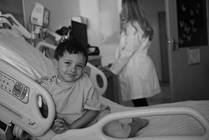
Blog
Pulmonary Vein Stenosis in Children: Multi-Disciplinary Care for a Complex Condition
There is still much to learn about pulmonary vein stenosis in children. Though outcomes have not changed much for the last 40 years in pediatric cases, many centers are collaborating to learn as much as possible about the disease.

Blog
Broken Bones 101
Whether you have toddlers or teens, you are familiar with the fact that kids regularly test the law of gravity. So you probably won’t be surprised to hear that broken bones are the number one injury we see in the emergency room.

Blog
Don't Let the August Heat Get You Down
Although summer is ending, August is usually a hot, muggy month. This means that the conditions are just right for your children to become overheated or dehydrated. Parents need to consider this as they send their kids out to play and to practice sports.

Blog
Asthma Myth: Exercise/Sports
Growing up in Pittsburgh, Pennsylvania, I had no choice but to become a raging Pittsburgh Steelers fan. So when I had the chance to work with Jerome Bettis, former running back for the Steelers and future Hall of Famer, during an Asthma Sports Camp a few years ago, it was a dream come true.

Blog
4 Tips for Encouraging Creativity in Children
From drawing and painting to playing an instrument or dancing, there are many ways that children can be creative while having fun. Here are 4 tips to set you and your child up for success as they explore creative pursuits.

Blog
Research to Improve The Lives of Children
Did you know that Nationwide Children’s Hospital is home to one of America’s top 10 pediatric research centers? On our campus, more than 180 scientists are researching cures for the biggest challenges in child health.
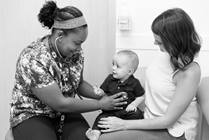
Article
Preparing for a Primary Care or Clinic Visit
When you come to Nationwide Children's for a primary care visit or a clinic appointment, knowing what to bring and where to go can make the visit go smoothly.
Article
Anorectal reconstructions
In some cases, a single reconstructive surgery can help restore a way for the body to pass waste; however, most complex malformations will require a series of surgeries, performed over several months, to help normalize bowel function.
Article
Colostomy
A colostomy is a surgical procedure performed on children who are unable to pass feces safely due to disease or anatomical defect.
News
Busting Common Myths about the Flu Vaccine
With cold and flu season upon us, many companies have geared up for what is predicted to be a busy flu season producing 150 million doses of the influenza vaccine, up 17 million from last year.

Blog
Foster Care Facts: Busting the 5 Most Common Myths
To truly support children in care, we must first understand the system they’re part of—and that means letting go of some long-standing misconceptions.

Blog
Your Child's Pediatric Ophthalmologist Visit: What to Expect
Many parents wonder how we can check a child’s vision or need for glasses. At your Pediatric Ophthalmology visit, we can assess vision at any age, check the need for glasses and evaluate the health of the eyes.

Blog
ADHD: What Is It, Does My Child Have It, and What Can I Do About It?
Attention-Deficit/Hyperactivity Disorder (ADHD) is considered a neurodevelopmental disorder, meaning it begins to reveal itself and cause problems as the brain develops during childhood. It impacts the ability to regulate attention, behavior, and emotion.

Blog
How Adults Can Prevent Child Abuse and Neglect
Every child deserves the right to grow up in a safe and healthy environment. However, this is not the case for many children. Protecting children from abuse and neglect is a community responsibility, and the need is urgent.
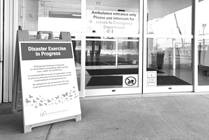
Blog
Why Do We Have Emergency Drills?
Regular emergency preparedness drills aren’t just games—they're vital to ensuring we are ready to respond quickly and efficiently when disaster strikes. Here’s what parents should know about these important simulations and how they protect your children and loved ones.

Article
The Day of Surgery
What to expect when you arrive for the day of your surgery at the Westerville Surgery Center.

Blog
Pet Medicine and Poison Prevention: Keeping Kids Safe
For many people, pets are an important part of the family and owning a pet can have many benefits. However, if you also have children, having a pet can come with some unexpected risks.

Blog
Helping Your Child With Lupus: From Team Care to Sun Smarts
Systemic lupus erythematosus (SLE) is a challenging disease given the unpredictability of flares, the potential for involving any organ system in the body, the side effects of some of the medications used for treatment and the stress of living with a potentially life-threatening disease.
Blog
Lawn Mower Safety Tips
This spring has brought a rite of passage for my 12 year old son – he is now officially old enough to mow the lawn. Working in the injury field, I always get nervous when he passes these milestones as I see what happens when things go wrong.

Specialty
Dentistry
Our pediatric dentists and specialists provide comprehensive preventive and therapeutic oral health care for infants and children, including those with special health care needs.

New Rapid Response Services for Young People in Mental Health Crisis
Nationwide Children’s new Mobile Response Stabilization Services works to send an expert team to the location of crisis – helping families avoid a trip to the emergency department.
News
Nationwide Childrens Hospital Reminds Parents to Stay Alert During Holidays
The holidays are an exciting and busy time of year as parents race to finish the shopping, decorating and baking. As the number of days left in the calendar year winds down, be sure to allow plenty of time in that hectic schedule for playing with your child and sharing holiday traditions as a
Article
Oral Glucose Suppression Test - Outpatient
An oral glucose suppression test is done to find out if the pituitary gland is releasing too much growth hormone (GH). The pituitary gland is a small gland (about the size of a pea) in the brain. It releases hormones into the bloodstream that affect growth.
Article
Surgery Centers Home Preparation Westerville and Main Campus
Prepare for your child's surgery with this Helping Hand
Specialty
Eosinophilic Esophagitis (EoE) Program
The Eosinophilic Esophagitis (EoE) Program at Nationwide Children’s Hospital provides expert diagnosis and care to children and adolescents with EoE.

Blog
Tips for Raising Multiples
Disclaimer: I’m an inexpert expert. Let me explain why. I’m a pediatrician. I studied YEARS to get my medical degree, graduated at the top of my class, chose pediatrics because I loved kids, but when I found out I was having twins, I did what any self-respecting person would do: I
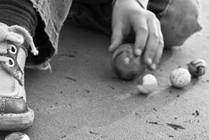
Condition
Meniscus Tears
Meniscus tears are common injuries. The meniscus is the rubbery cartilage disc between the tibia and femur. It acts as a shock absorber in the joint. The meniscus helps provide stability in the knee.
Article
Labiaplasty
Labiaplasty is a surgery done to remove excess labial tissue. Too much of this tissue can cause pain or discomfort to a female because of rubbing or chafing.
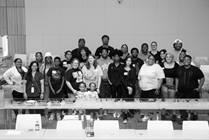
Students Speak: How a Hospital Program Helps High Schoolers Prepare for Life After Graduation
Nationwide Children’s is the only pediatric health care system that operates an Upward Bound Math & Science program – with a special focus on high school students who would be the first in the families to receive college degrees. As they head back for their senior years in high school, two students write about the impact of the program.

Condition
Thrush and Yeast Infections
Thrush is an infection caused by a fungus called candida. Thrush can affect a child's mouth or diaper area. Oral thrush begins as flat white spots and come together to form patches. These spots are often mistaken for "milk patches." Candida in the diaper area can cause a red rash with tiny blisters.
Gonorrhea: Expedited Partner Therapy (EPT)
Your partner was diagnosed with a sexually transmitted infection (STI) called gonorrhea. You may also be infected. This infection is serious but can be easily treated with antibiotics.
Pediatric Trigger Thumb
Pediatric trigger thumb (PTT) is also called a flexion contracture of the IP joint. It is a condition that affects the movement of the thumb in children. In PTT, a tendon cannot slide back and forth through the ligament and the thumb gets stuck in a bent (flexed) position.
Article
Awards and Recognition
Medical staff leadership would like to acknowledge physicians for recently receiving positive comments from patients and families.
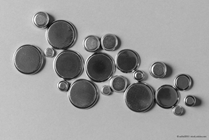
Blog
Dangers of Button Batteries
They’re tiny, shiny, and hidden in everyday items, but button batteries can cause life-threatening injuries if swallowed by a child. Learn where these batteries are hiding in your home, how to keep kids safe, and what to do in an emergency. Don’t miss these life-saving tips.
Article
Bronchoscopy (Flexible Bronchoscopy and Bronchoalveolar Lavage)
What to expect and how to prepare for your child's flexible bronchoscopy and bronchoalveolar lavage .
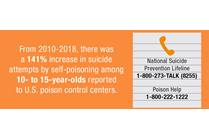
News
Suicide Attempts by Self-Poisoning Have More Than Doubled in Teens, Young Adults
A new study from Nationwide Children’s Hospital and the Central Ohio Poison Center found rates of suicide attempts by self-poisoning among adolescents have more than doubled in the last decade in the U.S., and more than tripled for girls and young women.

Article
Pet Medication Risks for Children
Almost two thirds of households in the US own a pet and many of these households have children. Many parents may not be aware of the risks these medications can pose to their families.
Article
Warts: Liquid Nitrogen Treatment
What to expect if your child is having a liquid nitrogen treatment to remove a wart.

Blog
What You Need to Know About Heat Rash
As outdoor temperatures climb, children and adults may break out in rashes. These skin conditions often get lumped into the catchphrase “heat rash,” but heat is usually an indirect or unrelated factor.

Blog
Eating Disorders: Awareness is the First Step
As the medical director of Nationwide Children’s Hospital’s Eating Disorders Program, I am a passionate advocate, but I must be honest – I was skeptical when asked to write about National Eating Disorders Awareness Week.

Blog
Child Abuse Prevention: Awareness, Disclosure, Suspicion
Preventing child abuse is everyone’s responsibility. This can be accomplished by learning about what to look out for, talking openly with kids, and acting quickly if you think something is wrong.
Article
INC Exclusive
In the Fall 2019 issue of Inside Nationwide Children’s, we shared stories of our employees who spent time at the hospital as patients.

Condition
Liver Failure in Children
Liver failure happens when the liver becomes so sick and damaged that it stops working, either partly or completely. Although this is rare, liver failure can happen even in children. Many of them recover well, but others become extremely ill, and some may need a liver transplant to survive.
Article
Anti-Urinary Reflux Surgery
In many children with reflux, the urine tubes meet up with the bladder with minimal muscle support. Thus pee goes back up the urine tubes to the kidney when the bladder squeezes to go pee. Anti-urinary reflux surgery helps stop this backward flow.
News
Nationwide Children’s Hospital Reminds Parents to Stay Alert during the Holidays
The holidays are an exciting and busy time of year as parents race to finish their shopping, decorating and baking. As the countdown of the calendar year winds down, be sure to allow plenty of time in that hectic schedule for sharing holiday traditions as a family.
News
Nationwide Childrens Hospital Reminds Parents to Stay Alert during the Holidays
The holidays are an exciting and busy time of year as parents race to finish the shopping, decorating and baking. As the number of days left in the calendar year winds down, be sure to allow plenty of time in that hectic schedule for sharing holiday traditions as a family.
News
Nationwide Children's Hospital Reminds Parents to Stay Alert during the Holidays
The holidays are an exciting and busy time of year as parents race to finish their shopping, decorating and baking. As the countdown of the calendar year winds down, be sure to allow plenty of time in that hectic schedule for sharing holiday traditions as a family.

Anterior Cruciate Ligament Tear (ACL Tear)
In this Helping Hand™ document, we discuss injuries to the anterior cruciate ligament (ACL). The ACL is one of four main ligaments in the knee. Surgery to rebuild the ACL is called arthroscopic ACL reconstruction. It usually takes 6 to 9 months of recovery before returning to normal activities.
Article
Growth Hormone Stimulation Test (Outpatient)
Prepare for your child's growth hormone stimulation test with this Helping Hand.
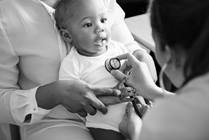
Article
EMS Outreach Program
Nationwide Children's Emergency Medical Services (EMS) Outreach Program provides expertise and leadership for EMS providers in 33 of the 88 counties in Ohio, making our pre-hospital catchment area the largest in the state.

Blog
Prenatal Genetic Testing: Is It Right for You?
Prenatal genetic testing can help find out if a fetus has a chromosome disorder. Chromosome disorders are often associated with multiple medical problems, such as intellectual disability and birth defects.
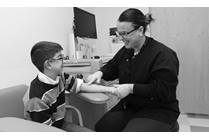
Blog
What to Expect When Your Child Needs a Blood Draw
While not many people want to have their blood drawn, there are a few things that parents and caregivers can do to help prepare a child for the process.

Blog
Jails are Replacing In-Person Visits with Video Visits
Social visits promote relationships that can improve health and well-being. People who are incarcerated who receive social visits are less likely to reoffend, and children who have strong relationships with their parents cope better with the trauma of having a parent incarcerated.

Condition
Omphalocele
An omphalocele is an abdominal wall defect that allows the intestine to remain outside the abdomen. An omphalocele can contain parts of the intestine, liver and other organs. The goal of surgery is to place the abdominal organs back into the baby’s body and repair the defect in the wall of the belly.
News
OhioHealth Riverside Methodist Hospital to open new, expanded Nationwide Childrens Hospital NICU
The expanded Nationwide Children’s Hospital Newborn Intensive Care Unit (NICU) at OhioHealth Riverside Methodist Hospital will open on April 11, 2017.
News
Nationwide Childrens Hospital Reminds Parents to Stay Alert during the Holidays
The holidays are an exciting and busy time of year as parents race to finish their shopping, decorating and baking. As the number of days left in the calendar year winds down, be sure to allow plenty of time in that hectic schedule for sharing holiday traditions as a family.
News
Nationwide Childrens Hospital Reminds Parents to Stay Alert During the Holidays
The holidays are an exciting and busy time of year as parents race to finish their shopping, decorating and baking. As the countdown of the calendar year winds down, be sure to allow plenty of time in that hectic schedule for sharing holiday traditions as a family.

Condition
Celiac Disease
Celiac disease is a chronic condition that results in damage to the lining of the small intestines. Symptoms are triggered by the ingestion of products that contain wheat, barley or rye proteins, collectively known as gluten.
News
FDA Grants Nationwide Children’s Hospital Researchers Safe-To-Proceed Authorization on First-In-World CAR-NK Cells Made with CRISPR/AAV
Researchers at Nationwide Children’s Hospital have received safe-to-proceed approval from the Food and Drug Administration (FDA) for Universal-Donor CD38KO CD33CAR-NK cells, to be studied in a forthcoming clinical trial. The Phase 1 trial will study the safety of the novel therapy in patients with advanced, high-risk acute myeloid leukemia (AML).
News
Nearly 2 in 5 Teen Drivers Text While Driving
(COLUMBUS, Ohio) – Cellphone use while driving has been estimated to increase crash risk by 2-9 times and texting while driving may be especially risky because it involves three types of driver distraction: visual (eyes off the road), manual (hands off the wheel), and cognitive (attention

Condition
Depression
Clinical depression in children includes several disorders: major depressive disorder, disruptive mood dysregulation disorder, and persistent depressive disorder.

Blog
Cough Talk: What Does All That Hacking Mean?
Coughs are often associated with the common cold and there’s little you can do, other than try to ease the symptoms. However, a lot of coughing, especially in babies under four months old, could be a sign of a serious illness.
Article
Military Veteran Careers
In an environment where everything we do matters, we have the opportunity to help all children reach their full potential by tapping into the full potential of all our employees, including our military veterans whose skills make us stronger, on the clinical and non-clinical side.
Article
PIVOTAL Network
The PIVOTAL Network is a group of healthcare providers, institutions, and researchers working in collaboration to determine the best approach to treat preterm infants diagnosed with patent ductus arteriosus, commonly referred to as a PDA.

News
Talking to Kids About Suicide
As kids head back to school this year, many of them will be struggling. According to national statistics, we lose more than 2,000 children and teens per year to suicide. Experts say parents who check in regularly with their child could have a life-saving conversation. Asking a child directly about suicidal thoughts is usually the best thing a parent can do to help their child open up about their emotions. Even if their child is not struggling with suicide or depression, parents can model for their child that it is good to talk about serious emotional concerns with trusted adults and important to reach out to friends to have these conversations, too.
News
Nationwide Childrens Hospital Named One of Americas Best Childrens Hospitals
Parents magazine announced today the results of its 10 Best Childrens Hospitals survey, placing Nationwide Childrens Hospital sixth on the elite list. In subspecialty areas, emergency medicine and cardiology/cardiothoracic services were ranked among the top three in the nation.
Article
Chest Physiotherapy - Infants Newborn to 12 Months
Chest physiotherapy, also called postural drainage, is a way for you to help your child get rid of extra mucus in his or her lungs.
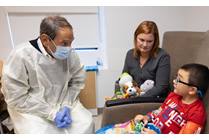
News
From Bench to Bedside: Patient with Duchenne Muscular Dystrophy Receives First Dose of Gene Therapy Developed at Nationwide Children’s Hospital
In a landmark moment for the Abigail Wexner Research Institute at Nationwide Children’s, a 5-year-old from Bellefontaine, Ohio, received the first dose of a recently approved gene therapy for Duchenne muscular dystrophy at Nationwide Children’s Hospital, where the therapy was invented and initially tested.
Article
Pinworm Test Collection Guidelines
Pinworms are small white worms about ¼ - ½ inch long and look like a small grain of rice. These worms can live in a person’s large intestine. The adult female crawls out of the rectal opening at night and lays her eggs on the skin around it.

Blog
Teens and Pregnancy: 10 Things They Don’t Tell Your Teen in Sex Ed
Some parents may find it awkward or difficult to talk to their kids about sex. Here are a few things they may not have learned in health class.

Blog
What Does it Take to Get a Medication Approved Through the FDA?
Medications are approved through the United States Food and Drug Administration (FDA). The process to gain FDA approval for a new medication can be long and expensive.
News
Lawn Mower Injuries Send 13 Children to the Emergency Department Every Day
On average every day in the United States, 13 children receive emergency treatment for a lawn mower-related injury. That adds up to almost 4800 children injured each year.

COVID-19 and the Compounding Children’s Mental Health Crisis
David Axelson, MD, chief of Behavioral Health at Nationwide Children’s Hospital, writes that COVID-19 has had a negative impact on an already existing pediatric mental health crisis. . .but a new national focus on the issue is a step in the right direction.

Article
Viral Season Resources
We are here to help you learn more about seasonal respiratory viruses and how to protect your family. Access resources and visitor guidelines.
Article
Ibuprofen (Motrin®, Advil®)
This Helping Hand™ includes dosing information, side effects, and how to take the common pain reliever ibuprofen (Motrin®, Advil®).

Article
Teen Volunteering
Learn about the application deadlines and understand some of the areas where teens volunteer.
Article
Heart Month
February is dedicated to increasing awareness for conditions that effect hearts of all sizes, both congenital and acquired heart disease and defects.
News
Nationwide Children’s Hospital Launches ‘Light Up the Lawn, Light Up a Life’ to Brighten Lives of Patients in the Hospital for the Holidays
Nationwide Children’s Hospital is launching “Light Up the Lawn, Light Up a Life” – a new holiday tradition that builds hope and joy for hospitalized children, families and the health care heroes caring for them.
Article
Oncology: Homegoing Instructions
This Helping Hand™ will help you know what to do when going home after a cancer treatment.

Condition
Gastroesophageal Reflux
Gastroesophageal reflux, also known as chalasia or spitting up, is so common that it should be considered normal for babies. In infants, the sphincter that keeps food in the stomach is not as strong, so some formula or food can come back up. Reflux can cause heartburn which may make the baby fussy.

Specialty
Liver Care (Hepatology)
Our center is an integral part of the Division of Gastroenterology, Hepatology and Nutrition at Nationwide Children’s, caring for a wide range of liver diseases through medical management and surgery.
Article
Acetaminophen (Tylenol®)
This Helping Hand™ includes dosing information, side effects, and how to take the common pain reliever acetaminophen (Tylenol®).

Condition
Scoliosis
Scoliosis (skoe-lee-OH-sis) is a deformity of the spine which results in a rotation and curve of the spine.

Article
Echocardiography
The echocardiography laboratory at Nationwide Children’s interprets over 11,000 echocardiograms per year and is the largest volume echocardiography laboratory in the state.
Article
Allergy Skin Testing
If your child is being seen for possible allergies, asthma, frequent infections or stuffy nose, allergy skin testing may be recommended. Testing can help find out what "allergen" causes the symptoms. It could be something breathed in, touched, or eaten.

Blog
Our Top 10 Blog Posts of 2017
For the past three years we have saved a slot on our calendar to list the top 10 posts of the year. In 2017, we shared year-over-year favorites, trending and newsworthy topics and told you about new initiatives.
Article
Epinephrine Auto-Injectors for Severe Allergic Reaction (Adrenaclick®, Auvi-Q®, EpiPen®, Symjepi®)
When and how to use an EpiPen if your child has a severe allergic reaction.

News
While Study Finds Decrease in Eye Exposures Associated with Household Cleaning Products, Experts Still Urge Proper Storage
A new study conducted by the Center for Injury Research and Policy and the Central Ohio Poison Center at Nationwide Children’s Hospital analyzed data regarding eye exposures associated with household cleaning products from 2000 through 2016 and found a decrease in the number of exposures during this period. However, the number of these exposures among young children remains high.

Blog
Scoliosis: Is the Curve in Your Child's Spine Normal?
Scoliosis is defined as curvature in the spine greater than 10 degrees. Scoliosis is a relatively common condition that causes the spine to curve and rotate into a C or S shape instead of a straight line.
Article
Inhalers: Spacers
Many medicines that help make breathing easier are taken by an inhaler. The inhaler must be used the right way, or the medicine will not get into the lungs to make your child feel better. A spacer is a device that helps the medicine get into the lungs.
Article
IV: Implanted Port
The implanted port is a device that is placed under the skin. It lessens the need to start an IV for every treatment.
Article
Lead Poisoning: Chelation Therapy
Some children with severe lead poisoning may need a medicine to help remove lead from their blood. Using medicine to take lead out of the blood is called chelation.

News
New Initiative Aims to Improve Diagnosis and Treatment of Children with Solid Tumors Through Molecular Analysis
The National Cancer Institute (NCI), part of the National Institutes of Health, Children’s Oncology Group (COG), and Nationwide Children's Hospital are poised to change the direction of pediatric cancer diagnosis and care. New results from international efforts to characterize pediatric cancers have led to the Molecular Characterization Initiative: a project that aims to collect, analyze, and report clinical molecular data to support COG-affiliated clinicians in choosing the best treatment for each child. This program is part of the NCI Childhood Cancer Data Initiative (CCDI).

Specialty
Heart Transplant Program
Heart transplants save and change lives. The heart transplant team at Nationwide Children’s focuses on maximizing a patient’s health before, during and after transplantation. Our goal is to help our patients achieve an ideal outcome after their heart transplant.
Article
Speech Services for Hearing Loss
We offers many speech services to meet the individual needs of your child and family. Services are based on your choices.

Condition
Elevated Liver Enzymes
Elevated (too high) levels of liver enzymes are a warning sign that something might be harming the liver. Two of these enzymes are alanine aminotransferase (ALT) and aspartate aminotransferase (AST). Symptoms of elevated liver enzymes may include jaundice and swelling of the abdomen, arms or legs.

Article
Partners in Care, Partners in Hope
The Family Advisory Council at Nationwide Children's Hospital is proud to award an annual recognition for excellence in family-centered care. Learn more about the award and the most recent recipient.
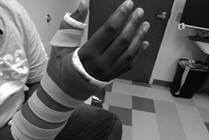
Blog
Broken Fingers: Why They Need Special Treatment and Care
Find out why a finger fracture is unique, tips for adjusting and why your child always needs care for a swollen, injured finger.
News
New Study Finds Children and Adolescents at Risk from Medicine Intended for Pets
Almost two thirds of households in the US own a pet and many of these households have children that either live in or visit the home. As pet owners know, it is common for pets to need medications either to treat health conditions or to prevent things like fleas, ticks, and heartworm.
News
Nationwide Children’s Hospital Announces Expanded Facility and Therapy Dog Program
Nationwide Children’s Hospital announced today Butterfly PAWS, an expanded facility and therapy dog program to support healing, and emotional and mental well-being and contribute to best outcomes for patients, families and staff. To celebrate Butterfly PAWS, the hospital unveiled “Canine Corner,” a special area on the first floor of the hospital featuring seating for families during their visit, animal friends Gus and Junebug and a digital display dedicated to highlighting pups and patients alike.

Condition
Total Anomalous Pulmonary Venous Return (TAPVR)
Total anomalous pulmonary venous return (TAPVR) is a condition where the blood vessels in the lungs, called the pulmonary veins, are not attached to the heart in the right place. Because of this, the body can’t get enough oxygen.
Rotavirus
Rotavirus (ROE-tuh-vie-russ) is a contagious illness caused by a virus.

Specialty
Intracranial Hypertension Clinic
The recognition of idiopathic intracranial hypertension in children has increased dramatically. We are leading the response to this trend with the development of a multidisciplinary clinic for the specialized diagnosis, treatment and ongoing care of these unique children.

Specialty
Hand and Upper Extremity Program
Children who are born with hand or upper extremity differences or experience a traumatic injury face unique challenges. Our program is one of the few in the US that includes Orthopedic Surgery and Plastic and Reconstructive Surgery, offering a comprehensive approach.

Condition
Double-Inlet Left Ventricle
Double-inlet left ventricle (DILV) is a heart defect where both upper chambers send blood to one lower chamber, causing mixed blood flow to the body and lungs. Most babies with DILV will need many heart surgeries over their lifetime. Most surgeries are successful, but your child will need cardiology care for life.
Article
High Blood Glucose (Hyperglycemia) and Ketones
Learn to manage high blood glucose and ketones.
Article
Ear Surgery: Care after Tympanoplasty and/or Mastoidectomy
Your child has had an ear operation, either a tympanoplasty or a mastoidectomy. There are a few things you should do for your child at home.
Article
Propranolol for Hemangiomas
Does your child have a Hemangioma? Learn more about how propranolol can be used to treat it.

Condition
Vomiting
Vomiting (throwing up) is most often caused by a virus or stomach bug. Some serious illnesses may also cause vomiting. Vomiting caused by a virus usually lasts only a couple of days. It can often be treated at home.
News
Justice Launches “Believe in Magic, Believe in Justice” Holiday Campaign Benefitting Nationwide Children’s Hospital
Ascena tween retailer Justice is supporting Nationwide Children’s Hospital this Holiday season with its “Believe in Magic, Believe in Justice” campaign running November 1 through January 5, 2019.
Article
IPE Courses
Physicians now have the ability to watch previously recorded CME activities online at their convenience. To access videos of Nationwide Children's activities for content only or to view presentations for Category 1 CME Credit, please read and agree to the provided disclaimer.

Condition
Dehydration
There are many reasons why children can get dried out or dehydrated. A child can lose too much liquid from the body from diarrhea, vomiting or fever. If the child has mouth sores or a bellyache, they may refuse to drink enough. Babies and younger children are at greater risk.
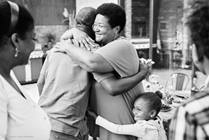
Blog
How to Have a Safe Holiday
The holiday season is upon us and many families are getting into the holiday spirit. It is easy to get caught up in the excitement and not realize the potential injury risks some of these activities can have. Learn how to prevent them.
Article
Letters from Leadership
We are so glad you are interested in our General Pediatrics Residency program. We encourage you to take a moment to read messages from our pediatrics chair, program director and 2024-2025 chief residents, all of whom share a little more about residency life, training and the possibilities open to
Article
Dental: Oral Sedation
Sedation can help your child feel less anxious, nervous or afraid, be more comfortable and stay still during the procedure.

Blog
How to Talk with Your Kids About Puberty
When kids are toddlers or preschoolers, they start asking questions about their bodies – and even yours. If you start early and talk to them often, then talking about puberty when they get older will be a lot easier.
Article
Seizure Information for Parents
Your child had a seizure. What do you do now? Learn more about safety, treatment and tips on living with seizures and epilepsy.
Hemophilia
Hemophilia is an inherited blood disorder. In hemophilia, a blood clotting factor is missing. In Hemophilia A, Factor VIII (8) is missing. In Hemophilia B, Factor IX (9) is missing. Without these factors, blood will not clot well. People with hemophilia are born with the disorder. It is not contagious.
Article
Cecostomy Tube
A cecostomy tube is also called a C-tube. It is a non-latex tube or catheter placed in the first part of the large intestine, also called the cecum. A procedure called an irrigation is done to provide a comfortable, convenient way to clean out the bowel.
Article
Nasogastric Tubes (Insertion and Feeding)
Feeding tubes are often used for babies and young children who are not able to take in enough calories by mouth. If the tube is placed through the nose into the stomach, it is called a nasogastric tube (NG tube).

Specialty
Pancreas and Liver Care Center
Families from across the country and around the world come to the Pancreas and Liver Care Center. As a national destination for pancreas care, the team also offers surgical expertise for genetic conditions or liver abnormalities, specialty services for complex liver conditions and advanced surgical options for patients who need liver transplants.

Condition
Jaundice in Children
Jaundice is a common condition in newborns that occurs when a yellow pigment (bilirubin) cannot be removed from the body fast enough and levels in the blood become too high. The buildup of bilirubin causes the skin and the white part of the eyes to appear yellow. Most cases clear without treatment.
Article
Curriculum
Our child adolescent psychiatric curriculum includes rotations at different facilities, including Nationwide Children's Hospital and The Ohio State University Medical Center.
Article
Nutrition
Children need good nutrition to grow into healthy adults. This chapter will teach you about the nutritional value of different foods and how to measure serving sizes.
Article
Infant, Maternity, and New Parent Resource Guide
Learn about what agencies in the Columbus area can help you with things you need to care for your baby.

